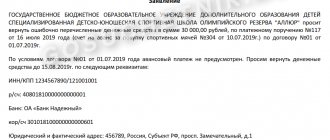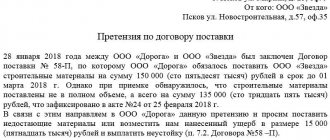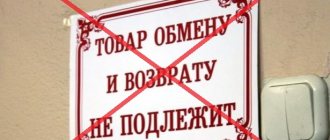Alexandra S.
Oct 2, 2021 · 6 min read
The situation when a client or user is dissatisfied with something and believes that the money already given to you was not just a waste, but a mistaken waste, happens everywhere and to everyone - no matter how good you are, someone else’s soul and loyalty are sometimes still uncontrollable darkness .
Let's not shed tears over potential losses, but let's figure out what can and should be done. How not to lose face, retain the client, and even leave a pleasant impression from such an incident - both for you and for him.
Conditions for returning money for defective goods
In general, you have the right to demand a refund for any defective product. Although there are some exceptions to this rule that are important to consider.
For which product is the seller required by law to return the money after the fact, without disputes or obstacles:
- household goods that are designed for long-term use (for example, electric razors and toothbrushes, etc.);
- any interior items and home furnishings (beds, sofas, mirrors, etc.);
- sporting goods;
- Food;
- medicines and other medicines;
- personal hygiene products, etc.
There are also some categories of purchased goods for which it will be difficult to return money after the initial application. They require objective verification and substantial evidence that the item is damaged through no fault of the buyer. These are products that are technically complex:
- cars;
- snowmobiles;
- refrigerators and freezers;
- computers, laptops, system units;
- satellite and digital television;
- gaming consoles;
- photo and video cameras (digital) and others.
In other cases, it will be impossible in principle to return the money due to various reasons. For example, if it is difficult to clearly prove that the product was not damaged by you after purchase.
A product is considered damaged if it has defects. There are different categories of such defects, and they are the legal grounds for demanding a refund of funds paid:
- Factory defects. That is, the product does not meet GOST standards or other important technical requirements, and it is for this reason that the product is problematic (or impossible) to use.
- Defect in production. For example, significant external deviations and shortcomings.
- Violation of storage conditions. This often leads to damage to an initially high-quality product.
- Inaccurate transportation, which can also spoil the quality of the product.
- Natural causes of goods damage. For example, a flood in a warehouse led to the breakdown of phones, which were previously dried and still sold in the store and others.
Such defects may have already existed at the time of purchase or may have manifested themselves some time after purchase. Time in this case is not so important. The only thing that matters is the reason why the malfunction occurred. And if this is the fault of sellers, store consultants or the manufacturer, this is a direct basis for a refund.
Therefore, in some cases it will not be possible to get a refund for the product. We are talking about the following situations:
- the buyer carelessly handled the purchased item, and this is what caused its damage;
- the buyer did not store the item in the manner required by the product recommendations;
- the true cause of the appearance of defects was the actions of other people or the consequences of uncontrolled natural conditions - only after purchase;
- the seller pointed out defects during the purchase and discussed the terms with the buyer before paying for the goods;
- the buyer did not contact the seller immediately after discovering the defect and tried to repair the item himself, which led to a real deterioration in its properties, etc.
It happens that both parties are to blame for a product malfunction - both the consumer and the seller/manufacturer. There are no clear legal regulations for such a case, and the problem will have to be resolved personally with the seller. It is best to admit the equivalence of guilt and try to come to an agreement. What options are possible here:
- The seller or manufacturer agrees to fix the fault himself - but only that part for which he is responsible.
- A compromise solution - the seller will return only part of the money, which is agreed upon with the buyer.
What the law says about deadlines
In general, you should request a return during the warranty period. However, in some cases you can go beyond these limits, but you need to start from the conditions and nature of the damage.
If the defect is small (no major damage or defects, does not particularly affect operation, etc.):
- If the product did not have a warranty, then the acceptable handling time is two years from the date of purchase.
- If there was a warranty, then it is better to apply during its validity period. However, you have the right to demand a return later, but in this case you will need to prove that the presence of a defect is the fault of the seller or manufacturer.
If the defect is significant, the conditions are as follows:
- You have the right to request a return two years after purchase (or even after the warranty period has expired, if it was two years). It is important that the service life of the product at the time of purchase is current.
- If the service period is not established, then the maximum period during which your application will be valid is ten years.
In cases with significant damage or defects, there are special conditions that are also important to keep in mind:
- a dissatisfied buyer can only contact the manufacturer;
- it is the consumer who must prove the significance of the defect;
- You cannot immediately demand monetary compensation: at first it is legal to demand only free repairs;
- You can demand a refund only if the manufacturer does not correct the defect within twenty days.
For certain goods (food, household chemicals, medicines and perfumes) exceptional conditions are established:
- It is best to request a refund within the expiration date.
- If the deadline has expired, you need to prove that the product you purchased was of poor quality.
- If you bought a product when its expiration date had already expired, this is a direct violation of the law on the part of the seller, and you can demand money at any time.
- You can also demand a refund at any time if the product does not indicate an expiration date at all.
The deadlines for refunds for certain categories of goods are also defined:
- if a guarantee is established - from six months to a year;
- during the period when the expiration date is valid;
- if there is no indication of expiration date or warranty period, then within a reasonable period, but not longer than two years;
- if we are talking about seasonal goods - before the onset of the corresponding season.
All these circumstances are regulated by the Consumer Protection Law. It is the points of this document that will be the basis for both initial appeals to the seller or manufacturer, and for further ones if the issue cannot be resolved at this stage.
How to sue a store?
If contacting Rospotrebnadzor does not have the desired effect, then the buyer can take an extreme measure by filing a lawsuit against the store . In this case, the entire procedure will be regulated by the norms of the Code of Civil Procedure (Civil Procedure Code of the Russian Federation).
Which court should I go to?
Courts of general jurisdiction deal with cases related to the protection of consumer rights. In this case, the claim can be filed with the judicial authority located at the place (clause 2 of article 17 of the Law of the Russian Federation “On ZPP”):
- store location;
- residence or location of the plaintiff;
- conclusion of an agreement between the seller and the buyer.
What to include in the statement of claim?
The success of the trial largely depends on the quality of the prepared statement of claim. All circumstances of a particular situation must be presented consistently and competently. In this case, it is imperative to refer to the relevant legislation .
Particular attention should be paid to the description of the identified defect, the procedure for pre-trial settlement of the issue, and the seller’s reaction. It is also necessary to mention the filing of the complaint with Rospotrebnadzor and the results of its consideration.
The wording of this part of the claim may look like this, for example: “10 days after purchasing the phone, I discovered signs of a defect in it, namely: a white stripe appeared in the middle of the screen, which did not disappear even after rebooting the smartphone. On the same day, I sent a written claim to the store for a refund for the defective phone and handed it over to the consultant.
However, my request remained unanswered. I was forced to write a complaint to Rospotrebnadzor, which in turn sent an appeal to the seller with a request to satisfy my demand. After that, I received a letter from the store, which said that the phone had been sent to the service center for testing, based on the results of which a specific decision would be made.
However, in fact, all the deadlines have long expired, and therefore I don’t want to wait any longer, but I want to return the money paid.”
After explaining the circumstances of the case, your arguments should be supported by specific norms from the Law of the Russian Federation “On ZPP” , and also indicate the requirements that the defendant must fulfill.
Additional documents
In addition to the statement of claim itself, the buyer should also provide the following documents to the court (Article 132 of the Code of Civil Procedure of the Russian Federation):
- power of attorney from an official representative (if another person is acting on behalf of the plaintiff);
- papers confirming the legality of the claim (examination results, photo and video recording, testimony of witnesses, etc.);
- a copy of the complaint sent to the store;
- a full calculation of the amount that the plaintiff wishes to recover from the unscrupulous seller (this may include money for the goods, compensation for damage, penalties for untimely fulfillment of requirements, etc.).
State duty
In accordance with paragraph 3 of Art. 17 of the Law of the Russian Federation “On ZPP” , claims related to the protection of consumer interests are considered free of charge . This means that you will not need to pay state duty.
Time limits for consideration of the case and execution of the decision
According to paragraph 1 of Art. 154 of the Code of Civil Procedure of the Russian Federation, civil cases, including those related to the protection of consumer interests, are considered and resolved within 2 months from the date of filing the statement of claim. The court decision will enter into force one month after its announcement. This period is allotted for appeal. Moreover, it must be executed immediately after the start of the action.
Thus, in the event of purchasing a defective product, buyers have every right to present to the seller one of the requirements provided for by current legislation. However, in order to achieve success in this matter, it is necessary to act competently.
Administrative return procedure: personal appeals and filing complaints and claims
So, you have taken into account all the conditions of the situation and are requesting a refund to the seller or manufacturer. Can you do it:
- orally during a personal visit;
- through written requests, complaints or claims.
In the first case, everything seems extremely clear, but it is better to take into account a couple of nuances:
- be sure to take all payment documents with you: checks, statements, etc.
- present the goods to the seller for personal inspection;
- do not allow the seller or manufacturer to take the goods before you receive your money.
A written form of appeal will be more effective when interacting with an unscrupulous seller or in controversial situations. First of all, this will be important evidence if you have to go to Rospotrebnadzor or the court.
Initially, you can apply for a refund for a defective product. It must be submitted to the seller or manufacturer. It should include:
- your data;
- seller details;
- Name of product;
- description and characteristics of the product;
- detailed description of the defect;
- an indication of satisfaction of the warranty period (or other conditions when recourse is possible after the expiration of this period);
- specific requirement to return funds.
The seller must sign this statement - even if he refuses to return the money.
If your request is granted, the seller will draw up a transfer and acceptance certificate, which will reflect the receipt of the defective product and a refund to the buyer.
If you cannot return the money in this manner, you can contact the claim form. It should be submitted in the name of the owner of the store where you purchased the goods - a legal entity or an individual.
What should such a claim contain:
- data – yours and the seller’s;
- Product name;
- its full description - appearance, technical characteristics, and so on;
- description of the purchasing process - according to the principle “on such and such a date the next product was purchased...”;
- your contacts;
- an indication that you previously contacted the seller and he refused to return (if this fact occurred);
- the period during which you are going to wait for the return;
- the specific requirement is to return funds in the specified amount.
The claim should be accompanied by evidence of your words: a sales receipt, an application for a refund for the seller, etc.
You should also reflect the seriousness of your intentions: if you do not get the money back, you will appeal to higher authorities or the court.
Then there are two possible scenarios:
- you will receive an answer: positive or negative;
- the answer to your complaint will be inaction.
If the manufacturer or store owner agrees to return your money, he will contact you at the specified contacts and inform you where and when you can get your money back.
In case of refusal or response silence, you can submit a written appeal again, but to other authorities - Rospotrebnadzor or the Society for the Protection of Consumer Rights.
What should reflect the content of requests to these organizations:
- your data;
- data of the store (its director, legal entity, seller, etc. - depending on the situation);
- a detailed description of the purchased product with a defect - external, technical;
- description of the situation - the moment of purchase, detection of damage or defects, contacting the seller and manufacturer, refusal or inaction in response;
- request to oblige the seller/manufacturer to return your money.
Attach all evidence of your position to the document: sales receipts, a claim or application for a refund, replies with refusal.
Once your application has been reviewed, you will be contacted (by phone, email, or via notification to your address) and informed of its decision.
If your request is granted, the seller will be obliged to return the funds to you within a specific period.
If at this stage you receive a refusal, but still do not agree with it, you can only go to court further.
How to complain to Rospotrebnadzor?
Sometimes there are situations when a store continues to ignore the buyer’s demands even after sending an official complaint about a low-quality product. The only way out in this case is to appeal to higher authorities. You should start with Rospotrebnadzor.
So, in order to complain to this department, you should take the following steps:
- prepare a written complaint;
- collect additional documents that will be sent as attachments;
- send a complete package of papers to Rospotrebnadzor in any convenient way;
- wait for the results of the consideration of the appeal.
What should I include in my complaint?
Particular attention should be paid to drafting a complaint. It should be short and understandable, but at the same time clearly describe the essence of the problem that has arisen. Events should be presented in chronological order :
- First, give a general description of the product, the store where it was purchased, and also indicate the date of purchase.
- Describe the signs of marriage and the circumstances under which it was discovered. As an example, we can give the following wording: “During operation, after 3 days a defect was discovered, namely: it was discovered that one of the shoes had a higher heel, which made it impossible to continue wearing these shoes.”
- Indicate exactly what attempts were made to resolve the incident with the store. Example: “Immediately after discovering the defect, I sent a written claim (attached to the store with a request to replace the shoes with a similar model.”
- Describe the seller's reaction. Example wording: “Upon receipt of the complaint, the store management did not conduct an investigation. At the same time, the seller rudely stated that they do not practice such exchange of goods, and also advised me to be more careful when buying shoes.”
- Express specific demands, for example: “I ask you to inspect the specified store regarding the sale of defective goods, and also to assist in the exercise of my legal rights as a consumer.”
Required documents
It is also recommended to attach the following documents to the complaint to Rospotrebnadzor:
- a receipt confirming the fact of purchasing the product in a specific store;
- testimony of witnesses (if available);
- a copy of the complaint to the store;
- results of an independent examination (if carried out).
Submitting an application
A complaint about the sale of low-quality goods should be filed with the territorial office of Rospotrebnadzor. And this can be done in several ways:
- by personal visit to the department;
- send online on the official website of the Federal Service for Supervision of Consumer Rights Protection.
Results of the appeal to Rospotrebnadzor
Upon receiving a complaint, Rospotrebnadzor specialists will have to inspect the store and find out all the circumstances of the incident.
Based on the results of this procedure, one of the following decisions can be made:
- Find the store management guilty, bring them to administrative responsibility, and oblige them to fulfill all consumer requirements. In this case, a detailed report on the actions taken and the results obtained will be sent to the latter.
- The buyer's complaint will remain unsatisfied due to the unlawfulness of the demands presented.
On our website you will find other useful articles that talk about what is considered a significant drawback of a technically complex product, what defects in production are and how defects are written off in trade, what to do when hidden defects are identified and who is responsible for the sale of substandard products.
What to do if the seller does not cooperate
The illegality of the actions of the seller, store manager or manufacturer must be clearly reflected in requests and claims.
What behavior can be considered unlawful, and what to do in such cases:
- They refuse to return your money or ignore your requests. Please indicate this in your written appeals to higher authorities or in court.
- You are not refunded within the specified period. Contact the store or higher authorities with a repeated request.
- The seller is trying to offer you another product or other services in exchange. Insist on a refund and indicate your intention to appeal “higher up” if you are not heard.
- The seller/manufacturer insists on examination, replacement of goods and other manipulations. If you still have to entrust him with the goods about which there is a dispute, make sure that they are properly packaged and have distinctive signatures - this will eliminate the possibility of replacing the goods or carrying out secret repairs. Also, take detailed photographs of the low-quality product in advance before giving it to the seller for personal inspection.
- The seller returned the product to you, secretly replacing or repairing it. Continue to insist on a refund, collect all evidence of the previous defect. If you still receive a refusal, contact other authorities or the court.
If the PC died
If your debtor has died, then there is still a chance to get the money back.
According to the law, debts are inherited. Yes, not only money, houses, apartments and cars are inherited, but also debts. If the heir has entered into an inheritance, he will have to pay all obligations. He can avoid such a turn only by renouncing the entire inheritance completely, but this does not happen often. If the amount of debt exceeds the entire inheritance, then no one will return the rest of the debt to you. The heir does not repay the debts of the former individual entrepreneur from his own money.
In any case, to get your money back you need to go through the algorithm described above. First try to solve the problem peacefully, and if unsuccessful, go to court.
Expertise – is there a need?
Commodity examination can become solid evidence both at the stage of appeals to Rospotrebnadzor or the Society for the Protection of Your Rights, and in court. If an objective opinion of an expert on a defect or damage to a product is recorded, the chances of resolving the controversial situation in your favor will increase significantly.
However, the necessity (and possibility) of such an assessment always depends on the situation. For example, there are a number of basic conditions in which this is possible and necessary:
- Before contacting the seller. If you think that a dispute about the nature or existence of damage will be inevitable, you can contact an expert in advance. The seller is required to be invited for inspection and assessment. An assessment by a specialist will not allow the seller to claim that you damaged the goods intentionally; the procedure (in the presence of each party) acts as a guarantor of objectivity in this matter.
- After an application that was refused. The seller may require an examination himself, but you can take such an initiative yourself. As we have already said, the seller will be aware that an independent professional assessment has been carried out.
- At the request of the court. If the proceedings take place in court, the court may order an examination in order to clarify the situation.
- The seller refuses to sign your application for a refund. To record the fact that you provided it, send the document by mail with an inventory.
A specialist assessment requires payment. How it can be done depending on the situation:
- you can pay yourself;
- it can be paid by the seller;
- you will pay in half.
Judicial procedure for returning money for low-quality goods
It is worth filing a claim after you have unsuccessfully contacted the seller or other authorities.
What you need to prepare for the application and the process itself:
- all documents for the goods or product;
- all sales receipts;
- documents on warranty or expiration date;
- all information that reflects a defect or malfunction - the results of a specialist’s assessment, photographs, videos, etc.;
- any evidence that the seller refused to accept the goods or return the money - an inventory of the application sent by mail, written response forms, video recording refusal, etc.
- all documents, checks and statements that record additional expenses - such as, for example, for examination;
- all claims and appeals that you filed administratively.
This evidence must be attached to the statement of claim, and subsequently used in court proceedings.
Also, be careful when drafting your claim. Please be aware of the following conditions:
- Like complaints, this statement must clearly reflect the purchase process, discovery of a defect, refusal to refund your money or violations by the seller/manufacturer, etc.
- A detailed description of the product and the fault (defect, defect) is required.
- All information, documents and other evidence that you use to support your position must be in a separate section “Attached Documents”.
- Under individual points, you address the court and express your specific demands - to return the money in the specified amount.
- Also, separately, you express your demands regarding the procedure for related material compensation - fines, compensation for examination, for example.
- You can also ask for compensation for moral damage, but this requires convincing reasons with evidence. For example, if the seller not only delayed the refund (or even refused it), but also treated you rudely: insulted you, was rude, or tried to manipulate the product in any way.
- The language of the statement should be concise. Avoid emotional expressions, write dryly, but in detail and exclusively to the point.
- Errors of any kind are not allowed.
- If you are not legally savvy enough, it is better to contact a lawyer to help you draw up a competent claim. Otherwise, your application may not even be considered.
The last point is also relevant for the stage of the judicial process - if you are not sure that you can confidently defend your case or quickly and competently respond to the arguments of the other side, legal assistance will be very useful to you.
What else is useful to know about going to court in such cases:
- You do not have to pay government fees.
- You have the right to demand not only a refund, but also compensation for any additional costs and expenses:
- for examinations;
- for the transportation of goods;
- for legal services and so on.
- If you are seeking compensation for moral damages, you will need comprehensive evidence.
At the end of the process, the court will make a decision. If it does not satisfy you, you have the right to appeal to higher courts - it is better to consult a lawyer.
If the decision is made in your favor, the following scenarios are possible:
- The seller or manufacturer will familiarize themselves with the writ of execution and return the money voluntarily.
- The seller or manufacturer will still refuse to return the money or will ignore the court decision. There are two legal options on your part:
- contact the bank where the seller’s (store owner’s) current account is located, show the writ of execution and demand the forced debiting of the specified amount of money to your card or account;
- apply with a writ of execution to the bailiffs.
Theoretically, any such conflict can be resolved peacefully. However, if the seller consistently refuses your legitimate request or violates your rights in any other way, do not be afraid to insist on your own and do not hesitate to contact all related authorities.
In some cases, especially when it comes to complex technology, it is better to initially turn to specialists for legal support - in such cases, you will need not only a deep knowledge of the law, but also familiarity with the specifics of the process.
- Lawyers and consumer protection lawyers








